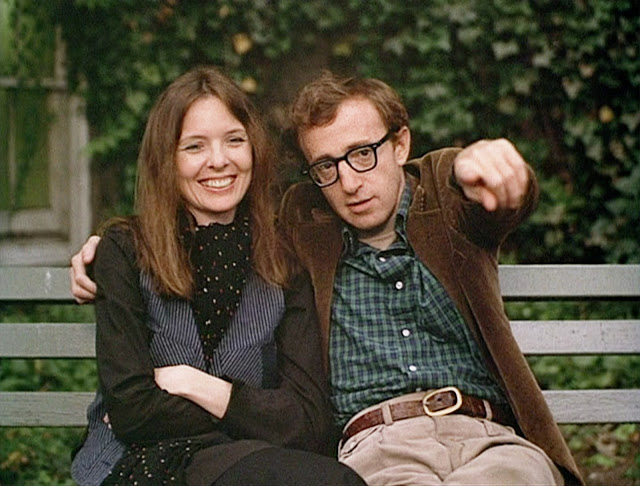‘Most of us need the eggs’
Woody Allen’s classic tale of love and life balances cutting humour with truthful reflection. Allen co-wrote, directed and starred in a film that shaped his future career and remains one of the most acclaimed comedies ever made.
Annie Hall follows Alvy Singer, played by Allen, a comedian who looks back over his relationship with aspiring singer Annie Hall, played by Diane Keaton. Alvy is a pessimist who finds it hard to enjoy life; he is at one with New York, and has carved himself a niche as a successful comedian, yet his private life is a mess following two failed marriages. Alvy is uptight, opposed to change and generally mistrusts the world around him.
One of the most striking elements of the film is its semi-autobiographical content. Allen and Keaton effectively played versions of themselves, as the screenplay is partly based on the pair’s real-life relationship earlier in the decade, and the film develops into a personal and honest account of love and its failings. We sense that the divide between fact and fiction is only thinly disguised, and the on-screen chemistry is all the more believable for it.
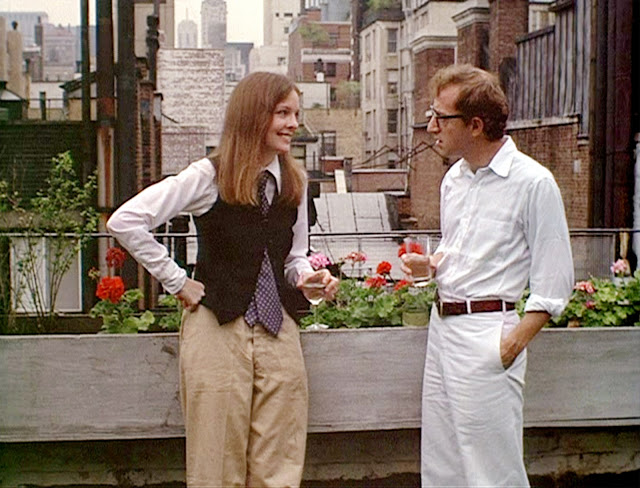
Annie Hall features an impressive range of funny jokes. The tone is set at the beginning as Alvy speaks directly to camera and explains his amusingly negative take on life; the film then launches off in various spontaneous directions in the form of flashbacks that are used creatively to give a fresh and unpredictable narrative, capturing snapshots in time. We follow Alvy’s past failures in life and with women, leading to his successful connection with Annie. As the two bond, she develops into a more confident woman who Alvy gradually begins to stifle; his inability to enjoy life is at odds with Annie’s increasingly carefree spirit and they are forced to split. While Alvy initially finds their break-up hard to accept, he ultimately acknowledges the time they spent together and the necessity for loving relationships, however brief they may be.
At the time, Allen was already an established comedian, actor and director, but Annie Hall signalled a new beginning. In terms of plot, the film expanded upon his previous efforts by focusing on human drama as much as humour. The material clearly came from personal experience and was driven by a need to convey real feeling, and it’s this feature that contributes to the film’s success. The creative visual style also marked a new chapter in Allen’s attitude to filmmaking, and his references to such masters as Ingmar Bergman and Federico Fellini are a testament to his love of cinema.
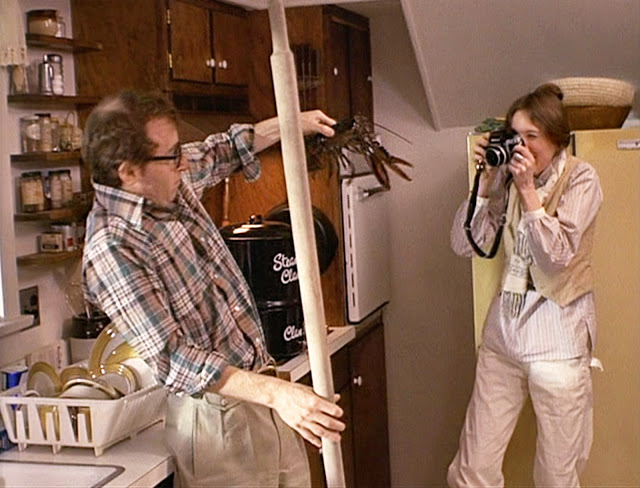
Allen’s screenplay, co-written with Marshall Brickman, is an incredibly witty, intelligent and moving analysis of life’s struggles and absurdities, and the dialogue between characters flows naturally, especially between Alvy and Annie in such scenes as the famous and awkwardly charming ‘la di da’ conversation. The film also takes pleasure in satirising several subjects, especially the later scenes in California as the show business lifestyle is ridiculed. Allen’s humour is full of cultural references and ranges from the clever to the absurd, but never diverts our attention away from the drama. One of the most impressive elements of the film is how Allen managed to integrate humour into what is essentially a story about a failed relationship; it’s a fine balancing act between comedy and tragedy, a trait shared with several classic comedies of its kind.
Crucially, Allen enlisted the talents of cinematographer Gordon Willis, whose contribution cannot be overstated. Willis was a skilled master of his craft who had worked with Francis Ford Coppola earlier in the decade on ‘The Godfather’ (1972) and ‘The Godfather Part II’ (1974), and he forged a productive working partnership with Allen that resulted in an inventive and visually creative film. The collaboration established a pairing that continued into the 1980s, and Willis later earned popular recognition, and his first Academy Award nomination, working with Allen.
Annie Hall cuts between scenes freely to give the plot a fluid and unstructured feel. Using a technique that has influenced countless imitations, when characters recall an event, we are immediately taken to the occasion in question. Allen makes a point of stretching this technique out for most of the film, and it’s an effective way of tapping into the feeling of nostalgia and reflection at the heart of the story, as characters revisit scenes from the past. When Alvy, Annie and Rob visit the old neighbourhood, past tales are creatively brought to life right in front of their eyes, and this echoes a similar technique used in such classic films as Ingmar Bergman’s ‘Wild Strawberries’ (1957).
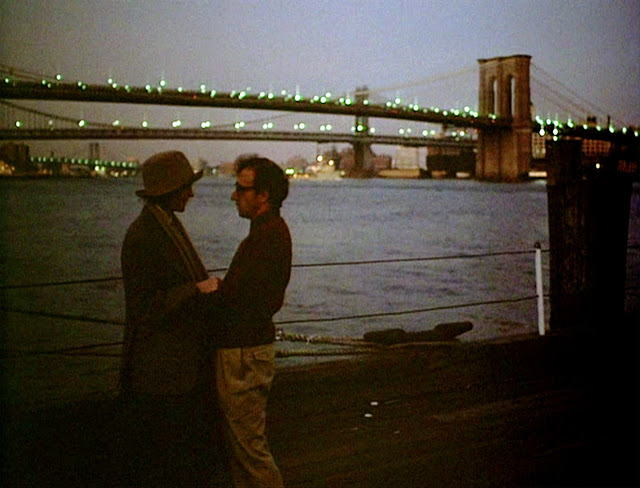
One of the most impressive elements of the film is the variety of story-telling techniques it perfects. Alvy frequently breaks the so-called ‘fourth wall’ by speaking to camera, thereby connecting with viewers in a humorous and intimate way; this technique acknowledges the illusion of film and adds a new dimension in which the main character can expand his thoughts. In one particularly funny scene, Alvy laments an outspoken faux intellectual, then proceeds to bring in real life philosopher Marshall McLuhan to silence him, and Allen takes this idea even further when Alvy talks to people in the street. These examples illustrate the director’s seemingly simple yet effective method of humouring others and showing the main character’s impulsive desperation.
The film uses several unconventional techniques to enhance our understanding of Alvy and Annie’s relationship: the ‘mental subtitle’ scene lets us into their thoughts on their first encounter, the split screen when the two are in therapy shows us both their similarities and differences, and in the bedroom, the projection of Annie’s ‘mind’ standing up shows the disconnect with her body and thoughts. These examples are both humorous and visually inventive ways of understanding the characters’ actions. Scenes are frequently shot unconventionally, such as when Alvy and Rob walk down the street in one continuous take towards the camera, which then moves with them, or in the bedroom with Allison when the camera moves a complete 360 degrees when following Alvy around the room.
The cast of the film was small and included memorable bit parts for the likes of musician Paul Simon, Allen regular Tony Roberts and a young Christopher Walken, while the two main actors excelled in their portrayal of quirky outsiders who are drawn together. Allen received significant praise for his direction and screenplay, yet he was often overlooked as an actor; his performance was a wonderfully funny and engaging portrayal of a hopelessly stubborn yet well-meaning man. Allen’s personality drives the film, and he created an image, essentially an exaggerated version of himself, that people have since continued to associate with him.
Diane Keaton was fantastic as the title character, whose fashion and style are iconic; her portrayal was incredibly natural and funny, and her innocence and charm make her an instantly likeable character. Keaton’s performance stands out as a highlight of the film, and she deservedly won an Academy Award and widespread fame for a role that defined her career in the following years.
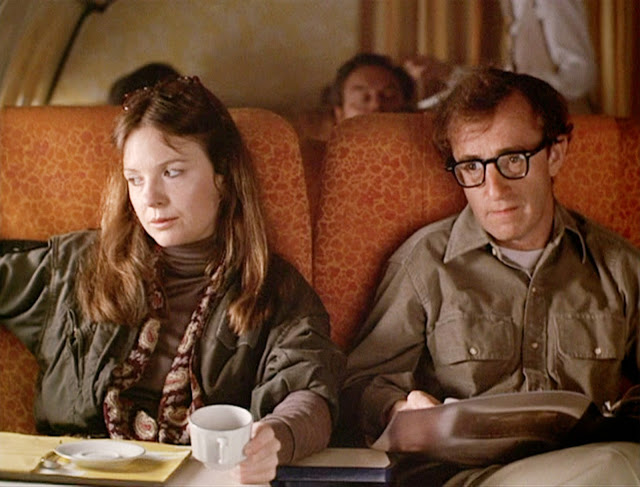
A notable success upon release, the film was universally praised as a humorous and bittersweet look at love that perfectly illustrated Allen’s quirky and amusingly down-to-earth style, and defined his future reputation. For a relatively low budget production, it also performed well commercially, and is one of Allen’s most popular films. At the Academy Awards, Annie Hall won for Best Screenplay, Best Actress and famously beat ‘Star Wars’ (1977) to Best Picture, a phenomenal achievement that signified the director’s breakthrough as a mature and respected filmmaker. Interestingly, for such a beloved and seemingly well-conceived film, the final result was very different to the film Allen initially imagined. The director envisaged a story centred around broader elements of Alvy’s life, but was later forced to cut down and focus on the relationship with Annie; despite Allen’s disappointment, the film fits together so well, it’s hard to imagine it being any other way.
Today, Annie Hall remains a genuinely timeless story about modern relationships. The film’s funny yet downbeat tone is an acutely observed reflection of real life, and its charm and wit contribute to its reputation as an intelligent and moving film. Above all, Annie Hall illustrates how people in love can evolve and move on from each other; while it’s Alvy who supports Annie in finding her feet as an artist, his inability to change means that their relationship is impossible to continue. This may be a sad truth, yet despite Alvy’s pessimism, the consolation he finds in the happy memories is the most telling conclusion of all.
